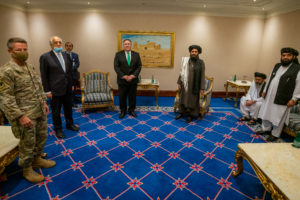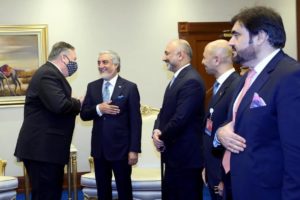One analyst says Taliban will demand power, another says government troops could switch sides
[Islamabad] The Afghan government and Taliban rebels are preparing for their first direct peace talks on Monday after decades of conflict that began with the Soviet invasion of Afghanistan in 1979.
The talks are being held in Qatar under American auspices 19 years after the 9/11 terrorist attacks triggered a US invasion of Afghanistan to rout out the perpetrators.
An opening ceremony was held at the Sheraton Hotel Doha on Saturday. Present were the delegations, donors and US Secretary of State Mike Pompeo. Foreign ministers and ambassadors spoke to participants by video link.
Masoom Stanekzai, a former Afghani director for national security, is leading the government’s 21-member team. The Taliban, who had previously refused to hold talks with Kabul, sent a team led by Mullah Abdul Hakim Haqqani, the group’s chief justice and the most powerful figure on the Taliban’s top consultancy council.
Taliban Supreme Commander Hebatullah Akhunzada reshuffled the team ahead of the talks, appointing members considered more influential and hardline. He also named Mohammad Naeem Wardak as the delegation’s spokesman.
Pompeo, Taliban deputy leader Abdul Ghani Baradar and Abdullah, the former chief executive of Afghanistan’s unity government, were among the keynote speakers at Saturday’s opening ceremony.


US Secretary of State Mike Pompeo meets with leaders of the Taliban team (top) and representatives of the Kabul government. (State Department; Afghanistan High National Reconciliation Council- handout/Anadolu Agency via Getty Images)
Qatari Foreign Minister Mohammed Bin Abdul Rahman Al Thani told participants that the “warring sides must rise above all forms of division by reaching an agreement on the basis of ‘no victory and no vanquished.’”
Pompeo said that “the rival sides must utilize this opportunity to secure peace for the sake of future generations” in Afghanistan.
“If Afghanis are interested in US assistance, they should consider democracy, human rights and the achievements of the last 19 years,” he stated.
“It took hard work and sacrifice to reach this moment, and it will require hard work and sacrifice to keep it alive and to take advantage of it so that the talks result in a durable peace,” he added.
Baradar said that a peace process “can attain success only with the complete implementation” of an agreement reached between the Taliban and the US on February 29 in Doha.
The agreement called for a reduction in overall violence and prisoner exchanges between Kabul and the Taliban, leading to peace talks.
“We have implemented and will continue to honor the commitments outlined in the Doha agreement,” he stated. “Moreover, we assure the world that we will strive to our utmost ability to attain a successful outcome during intra-Afghan talks.”
We have implemented and will continue to honor the commitments outlined in the Doha agreement
Abdullah called for a humanitarian ceasefire.
“Each freed prisoner is happy to be home, but there is the opportunity to take this happiness to every Afghan home by making the current peace negotiations a success and by announcing a ceasefire and an end to the war,” he told participants.
Each freed prisoner is happy to be home, but there is the opportunity to take this happiness to every Afghan home by making the current peace negotiations a success and by announcing a ceasefire and an end to the war
Suhail Shaheen, a former Taliban spokesperson who is on the group’s negotiating team, told The Media Line that a ceasefire “will be a part” of the talks.
“We hope that the intra-Afghan talks are a step toward a lasting peace in war-torn Afghanistan,” he said.
US President Donald Trump said on Thursday during a White House news conference that the start of the negotiations were “the result of a bold diplomatic effort on the part of my administration” over the recent past.
“The US will play an important role in bringing the parties together to end the decades-long war,” he said.
Pakistani Prime Minister Imran Khan welcomed the long-awaited talks.
“I have underlined for a long time that there is no military solution to the conflict in Afghanistan and that the only way forward is a negotiated political settlement,” state-owned Radio Pakistan quoted him as saying on Friday.
“Pakistan has played a pivotal role in facilitating the Afghan peace process to this juncture,” he added. “We feel deeply gratified…. as we have fulfilled our responsibility.”
NATO Secretary-General Jens Stoltenberg said that “with the start of intra-Afghan negotiations, we are entering a new phase of the Afghan-led and Afghan-owned peace process.” He was speaking via video link.
“Afghanis want peace, and so does the international community, which has supported Afghanistan on this long, hard road,” he added.
Direct peace talks between the Taliban and the Kabul government had been scheduled to begin in March but were delayed several times because of disagreements over a prisoner swap.
The US-Taliban accord stated that “before starting intra-Afghan dialog, the Afghan government will release 5,000 Taliban prisoners, while the Taliban will release 1,000 Afghan security officials from captivity.”
The Taliban freed 1,000 prisoners but the government remained six shy of the 5,000 it said it would release. It said these prisoners were involved in severe human-rights violations, including the brutal killing of Western troops, and that it was acting at the behest of Australia and France.
The Taliban had previously insisted that they would not negotiate until all 5,000 were free. Apparent behind-the-scenes efforts by the United States, Pakistan and Qatar resulted in the six being handed over to Qatari officials on Thursday.
Ahead of the talks in Doha, the head of the US Central Command, Gen. Kenneth F. McKenzie Jr., met with Pakistan’s army chief, Gen. Qamar Javed Bajwa, at the general headquarters in the Pakistani garrison city of Rawalpindi. They discussed numerous issues, “including the Afghan peace process,” the Pakistan Armed Forces Media Wing said in a news release.
The Media Line asked Michael Kugelman, the Wilson Center policy forum’s deputy Asia Program director, for his views on the peace talks.
“The intra-Afghan negotiation will be long, fraught and complex. These are two sides with very different goals and worldviews,” said Kugelman, who is also the South Asia senior associate at the non-partisan, Washington-based think tank.
The intra-Afghan negotiation will be long, fraught and complex. These are two sides with very different goals and worldviews
“If there is a peace deal, it will likely take quite some time to get one,” he related.
“It is important to remember that there were multiple past opportunities to launch a peace process”, he said. “One major obstacle was not the Taliban, but the US government – for [understandably] rejecting the Taliban’s demand that Kabul be kept out of talks with the US.”
Kugelman notes that Trump was “the first” to accept that demand.
“Pompeo, speaking in Doha at the launch of Afghan peace talks, suggests that ‘the decisions made in negotiations could impact future US aid to Afghanistan.’ That’s a significant indication that the US will use funding, rather than troops, as leverage,” he stated.
He believes that the Taliban will “push for holding a fair degree of power” and could succeed. But questions remain.
“Will non-Taliban elements be willing to share power within a more Taliban-friendly political system? Will the Taliban be willing to share power with elements of the current government, which it has long rejected? These are tough, complex questions,” he said.
Security analyst Naeem Khalid Lodhi, a retired Pakistani general and former defense minister, told The Media Line that “these intra-Afghan talks could lead to the dawn of peace in Afghanistan” but they would need to be “Afghan-led and Afghan-owned” before this happens.
”The US, along with some of its Middle East allies, is spearheading these talks. So these talks, later on, must be left to Afghans themselves, or there should be other interlocutors, like Pakistan and Turkey,” he said.
“The Afghan Taliban’s attitude is probably to remain docile until the exit of US-led foreign troops from their country. After that, they are likely to change unless we bring in a consortium of countries [such as Pakistan, China, Russia and Iran] that the Taliban trust to provide guarantees,” Lodhi said.
“The future of [Afghan President] Ashraf Ghani’s government is bleak,” he proclaimed, “and everyone knows it. Thus, the dilly-dallying from Kabul’s side, with more to come.”
The future of Ashraf Ghani’s government is bleak, and everyone knows it. Thus, the dilly-dallying from Kabul’s side, with more to come
Ghani, he went on, is “likely get a rude shock by end of this year or early next year, when some of his forces might switch sides.”
Lodhi also said that the Taliban would emerge as “a strong political power to reckon with and would occupy prominence in a future dispensation,” adding that “those who aspire to peace in Afghanistan and those who don’t [will make themselves clear] in the next three months.”